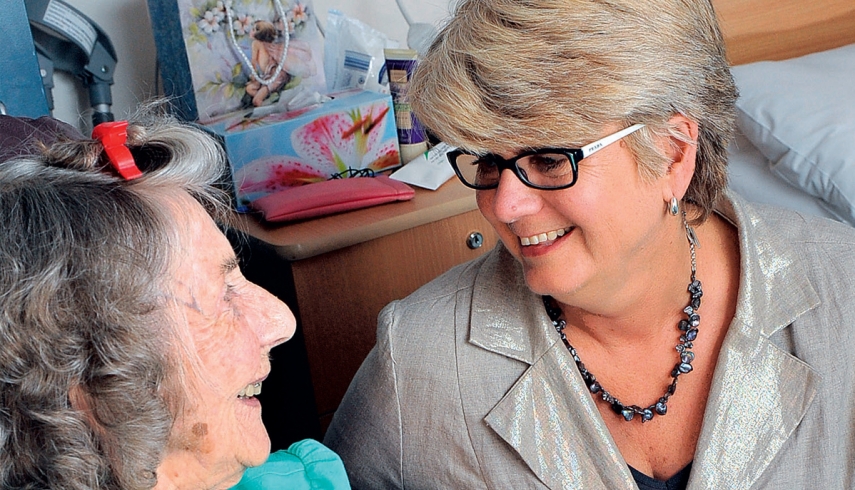With the world acknowledging the triumphs and tribulations of women on International Women’s Day last week, Melissa Cunningham shines the spotlight on three of the west’s most influential females
Beverly Knight vividly recalls the most defining moment of her time representing the Essendon Football Club board. It was 1994. Essendon had won the premiership the year before and it was the team’s first home game at the MCG since. The crowd was roaring.
The 1993 AFL premiership flag was flapping in the air as Knight stepped out on the ground, wearing a fitted skirt and hat.
“I’d spoken to my brother just before I went out onto the oval and he asked me what I was wearing,” she says. “I said to him, I’ve got slacks on and my Essendon uniform and he said: ‘I want you to put a skirt and a hat on’.
“They were very wise words. He wanted people to know I was a woman. When I stepped on the ground with the other directors and team it just hit me. There I was, standing as a woman making decisions for a very proud football club in front of thousands of people.”
That year Knight became the first woman to be elected to an AFL-club board.
“When I was elected I had a call from [then Essendon player] Michael Long who was a close friend of mine and he said, ‘You’re about to find out what it’s like to be indigenous’.
“The first few years were difficult. I always took the good with the bad. But there were some really ugly times.”
Knight grew up in Essendon and says football was embedded during childhood.
“My grandfather had been the director of Essendon when I was born,” she says. “We used to celebrate Christmas at Windy Hill.”
Knight has been dubbed the woman who revolutionised football. In her first year on the board, she was pivotal in increasing the club’s membership from 10,000 to 25,000.
“People often asked me what I did to increase numbers but all I did was help create a structure to let the fans have a voice.
“I recognised them as being an essential part of the game and encouraged fans to become members. I also wanted to increase child participation.”
But it was not just increasing the club’s fan base that Knight undertook in her time on the board. She was pivotal in raising the profile and sponsorship of indigenous footballers in the AFL and helping them have a voice.
While she says her interest in indigenous affairs wasn’t intentional, her fervour for equal rights, opportunities and education for indigenous Australians has seen her become the legal guardian to eight indigenous children and to sponsor endless others.
She was also a director of AFL Sportsready for 12 years, which helps indigenous people have a career in sport.
During her time on the Essendon board Knight advocated for 30 per cent of the board to be women.
She says the road to gender equality in football wasn’t an easy one. “Women have a valuable skill-set to offer football because they see things in a different way.
“It doesn’t always mean they are always right, but it is really important to be able to have that conversation.
‘‘I think the difficulty with women is sometimes when they speak up in a group of males their voice can sound verbose. You don’t get that when the group is made up equally of males and females.”
In 2009, Knight convinced the board to have three appointed directors and six directors elected for their skills, paving the way for women to take on senior roles with the AFL.
It’s taking on senior roles which is the name of the game for Nicola Roxon.
The Gellibrand MHR made headlines last month when she resigned from Parliament. Roxon became emotional when she spoke of balancing her family life and politics.
She says for women with careers in leadership positions there are great rewards, but also enormous challenges. The 45-year-old cited family as a reason for retiring at the next election, saying that when she was elected she had not met her husband Michael. Now she’s married and her only daughter Rebecca will be in high school at the end of the next parliamentary term.
“It is good for children to see their parents interested in the world around them and it’s good for mothers to be actively involved in their communities and role models for their children,’’ Roxon says.
‘‘But with that comes the difficulty of dividing your time between your family and your career.
“I always felt I was listened to well, but I think sometimes women get underestimated. Especially as a young woman, you can sometimes be criticised for being over ambitious or too pushy. But early on I made a promise to myself to ignore it. Ultimately women have the last laugh when people underestimate their strength as leaders.”
During her years as Federal Health Minister and Attorney General Roxon was involved in landmark decisions.
She was fundamental in introducing the world’s first plain-packaging tobacco laws last year and in establishing the royal commission into child sex abuse.
The plain-packaging laws were close to her heart because her father, Jack, died from esophageal cancer when she was 10.
“The driver for that legislation was the unnecessary death of 15,000 Australians every year,” Roxon says. “It was to stop people from losing their loved ones too early.’’
She was also a leader in seeking employment equality for women who were in the lowest-paid jobs, a driving force for paid parental leave for working women and behind the 24-hour GP hotline so parents can call a doctor in the middle of the night.
While Roxon says life in the public eye as a politician can be difficult, perception of women in politics is slowly changing.
“We aren’t a delicate, protective species,” she says. “My advice is for women to follow what they believe in. Don’t be defined by those around you. In your political life people judge you quickly; it’s hard to remake yourself. Start in the tone and manner you want to be remembered.”
Like Roxon, Western Health’s chief executive officer Associate Professor Alex Cockram says her curious mind and desire to help the community’s most vulnerable led her to a career in health.
The qualified psychiatrist studied medicine at Monash University. She has been an associate professor in Melbourne University’s department of psychiatry at the Royal Melbourne Hospital as well as executive director of NorthWestern Mental Health.
‘‘To be a psychiatrist you have to have a non-judgmental curiosity about people’s life experiences,’’ she says. ‘‘You need to have an interest in trying to understand people, in a non-judgmental way, so you can then help them in their challenges. I’ve always been interested in how people think and why they think in a particular way.
‘‘It’s about getting to a mutual point with a patient and finding a solution together.’’
Cockram says she was drawn to the role at Western Health last year because it is an expanding dynamic health service with a growing population with significant needs.
‘‘There are needs that are particularly prevalent in the west,’’ she says. ‘‘It is a culturally linguistically diverse community with high rates of cancer, chronic disease, smoking and mental health problems. The challenge for us is delivering services to a community with multiple languages and connecting with different cultures.’’
Cockram says that health is a profession open to women in leadership, with many female leaders and mentors already paving
the way.
‘‘Young women can get caught into thinking there is only one career pathway and they can get very anxious if they miss opportunities because of their personal or family circumstances,’’ she says.
‘‘They think if a door closes another one won’t open, but I say to them opportunities come up in different ways and don’t miss the wonderful experiences you gain from your personal life.
‘‘The opportunity will come back and the gate will open at a different time. You can find a balance between work and family life, but you just have to keep an eye on what you are doing it for.” ■








